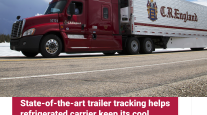Senior Reporter
Electric Class 8s to Affect Trailer Design, Components

The mounting focus on the electrification of Class 8 vehicles will prompt changes in trailer design and key components as collaboration among manufacturers of trucking’s central pieces of equipment increases, some experts said.
On tap soon for trailers: battery packs, electric drive motors at the wheel ends and regenerative braking to aid electrified Class 8s, they said.
Motors at the wheel ends, for example, could completely change the design of the tractor-trailer system, Rick Mihelic, principal of Mihelic Vehicle Consulting, told Transport Topics.
“In the near term, I think what you are seeing is an evolutionary thought process where companies are trying to electrify the tractor as it looks and operates today. That kind of limits the solutions space to something that looks like something you currently have. The magic that is possible with electrification is that you don’t have to follow the rules,” he said.
Take autonomous trailers as an example, as shown in the new movie “Logan.” The film, distributed by 20th Century Fox, has a highway scene where some of the moving vehicles are just autonomous trailers, running without tractors.
“That’s one of the visions,” Mihelic said.
Also underscoring anticipated changes in the industry is truck maker Navistar International Corp.’s recent move to reassign William Kozek, who had been president of its truck and parts business, to focus on vehicle electrification and potential disruptive technologies. He will report to Navistar Chairman and CEO Troy Clarke.
Regenerative braking on trailers is on deck as well, said Trevor Milton, founder and CEO of Nikola Motor Co., which is developing a hydrogen-powered battery electric longhaul Class 8 vehicle.
Also coming will be “braking coordination for better stability control, zero-emissions reefers, cameras and self-driving sensors with telematic connections to the truck — many of which we are working on,” Milton told TT.
To better integrate trucking’s main pieces of equipment, a truck maker possibly will buy a trailer maker, Mihelic suggested. Or more likely, there may be a startup company that approaches equipment electrification from a whole different perspective — as Japanese automakers did with smaller cars in the 1970s, introducing them in the United States and initially capturing that market, he said.
And Volvo announced on July 5 its plans to build only electric and hybrid vehicles starting in 2019, making it the first major automaker to abandon cars and SUVs powered solely by the internal combustion engine.
Or perhaps the industry will be shaken up before anyone sees it coming. “It may be a Chinese company or a Korean company that gets their foot in the door with something different,” Mihelic said.
Or maybe it will be disrupted by Jeff Bezos, founder and CEO of Amazon.com, said Charles Willmott, chief sales officer at Strick Group. “[That Bezos] could wave his wealthy wand and create a whole new compelling value, closed-loop freight transport system on a whimsical vision has to be keeping many trucking company execs awake at night. I know it does me,” he said.
Other trailer makers said they anticipate less dramatic changes.
More near-term, electric regenerative braking would be an obvious benefit, allowing trailers to recharge truck batteries when going down grades or stopping for traffic, said Jeff Bennett, vice president of engineering and product development at Utility Trailer Manufacturing Co.
“Today, when stopping, all of the trailer’s kinetic energy goes into heating up the wheel ends and wearing out brake pads, which stops the tractor-trailer by wasting all of its kinetic energy,” Bennett said. “In the future, brake pad life expectancy will triple that of today, and much less energy will be wasted,” Bennett said.
Great Dane’s trailers could eventually come with “advanced braking systems that can assist the tractor or possibly drive the trailer suspension,” said David Gilliland, vice president of national accounts.
“We are reviewing ways to make the trailer more aerodynamic to eliminate drag as well,” Gilliland said.
Regenerative braking is a rather minor change in trailer design, said Les Jaworski, Hyundai Translead’s general manager of research and development product support.
“I do not expect any major changes to the trailer design,” Jaworski said. “To save electric energy, all trailer lights will be LED lights.”
Lighter trailers will likely be a key focus in the future, too, said David Giesen, vice president of sales at Stoughton Trailers.
“There is going to be long-term pressure to take further weight out of trailers,” as a result of ongoing GHG regulations, he said. “The [offset] weight reductions could be used to haul more freight.”
Meanwhile, the standard seven-pin connectors that are used to link tractor and trailer are really not designed to deal with this new evolution, Mihelic said.
“That is kind of the awkwardness right now. Mating the truck and trailer in a different way will require some [standards-setting] groups to get together and agree on how to do that,” he said.




